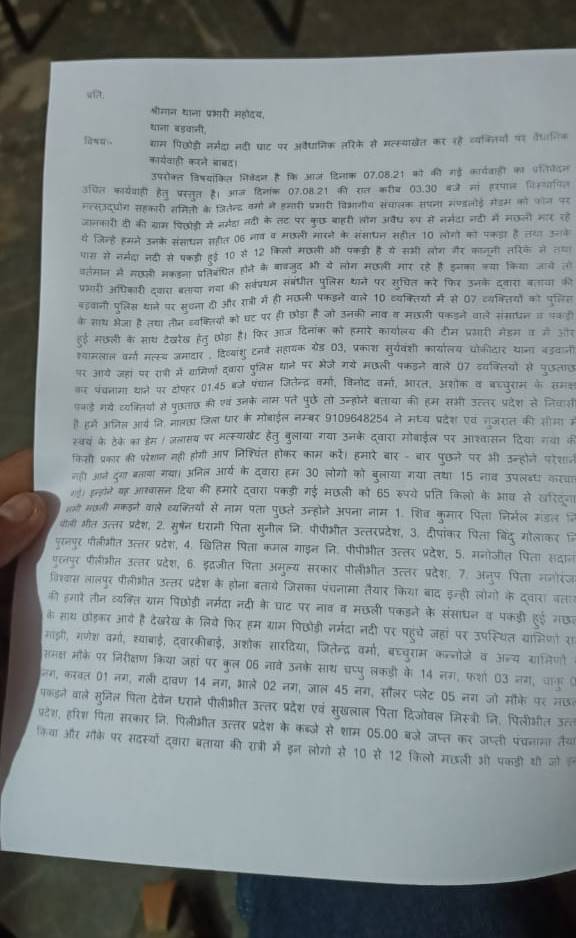They lost their land and homes to Sardar Sarovar Dam, and now illegal fishing adds to their woes
Over a decade ago, the traditional fishing community of Barwani in Madhya Pradesh lost their homes and cultivable land to Sardar Sarovar Dam’s submergence and now it is facing fresh challenges from ‘outsiders’ involved in illegal fishing activities in the dam’s reservoir. FIR filed. Details here.
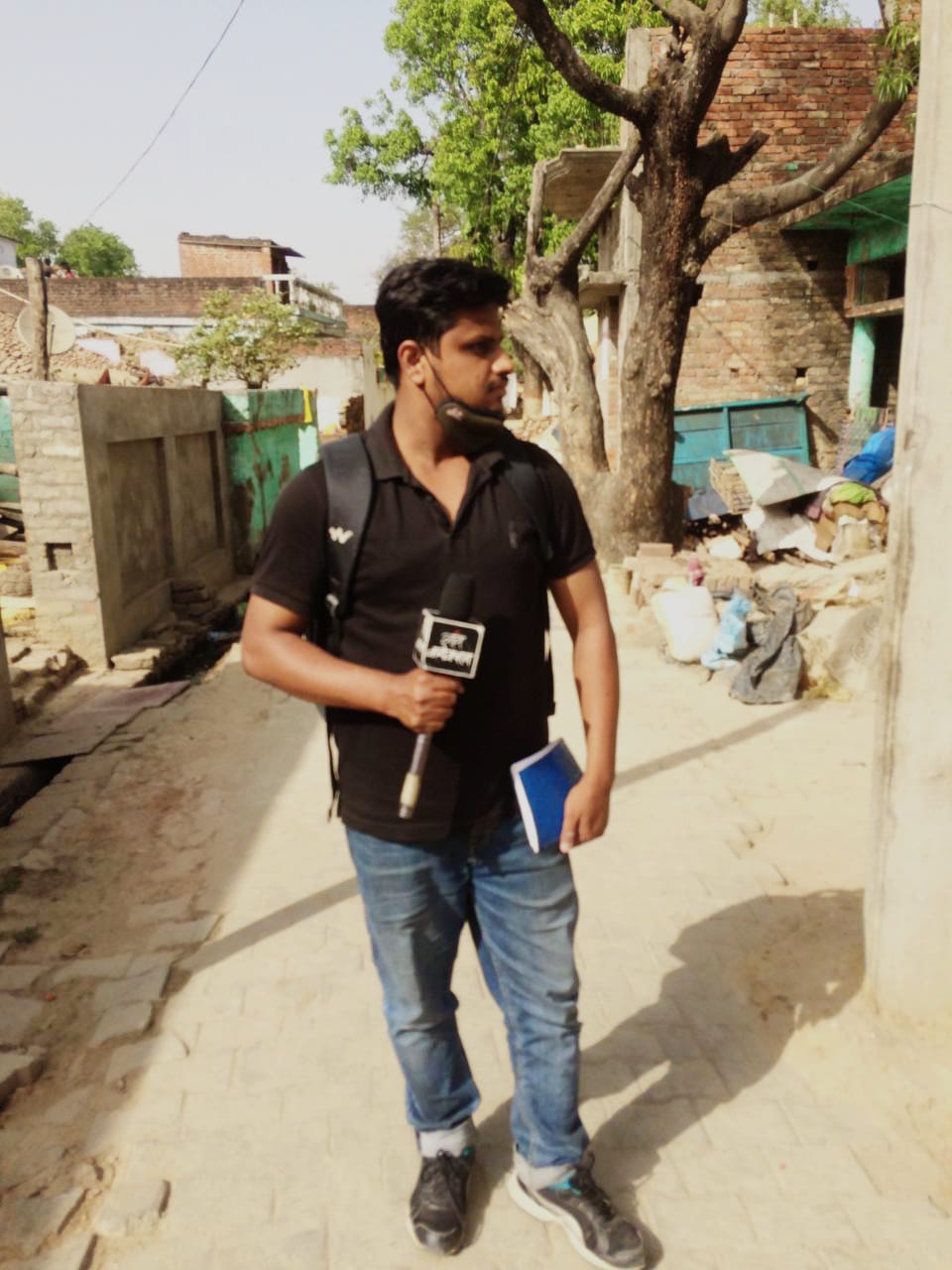

For now the outsiders have stopped all fishing activities in the reservoir but there is tension in the air and the villagers have adopted a wait and watch policy. Photos by arrangement
Jitendra Majhi is a fisher who daily walks up almost two kilometres from his makeshift house to fish in the backwaters of the Sardar Sarovar Dam on the Narmada river. A resident of Bijasan village in Barwani district of Madhya Pradesh, he blames the dam project for uprooting him from his homeland, stalling his education and destroying the traditional occupation of his fishing community.
“We saw our village getting submerged in the backwaters of the dam in 2008. Instead of fishing in the Narmada river, we are now forced to fish in the reservoir of the dam with very deep water levels. Worse still, outsiders illegally come to the reservoir to catch fish that affects our earnings,” 30-year-old Jitendra, who was forced to drop out of school in class 10th, told Gaon Connection.
When Jitendra was in school, his father used to go fishing in the river all by himself. But after the river was dammed and the reservoir built, the depth of the water level increased manifold and it became unfeasible for Jitendra’s father to alone row the boat in the reservoir and catch fishes. As many as 1,500 families are dependent on the fishers who catch fishes in the backwaters of the dam in the Barwani district.
Also Read: Life dries up as a village on the bank of Narmada in Madhya Pradesh runs out of water
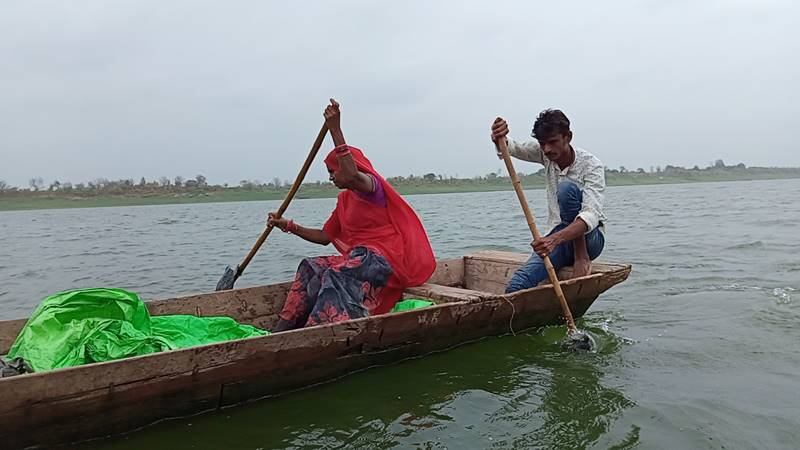
“My father couldn’t do it alone. It was risky as well. I had to quit my education and help my father in fishing,” narrated Jitendra. “Ever since then life has been a big struggle and the latest trouble is outsiders sneaking into our area and illegally fishing in the reservoir,” he added.
This has led to a situation of conflict between the local traditional fishing community and the outside fishers.
Traditional fishers vs outsiders
“Earlier this month, on August 5 to be precise, local villagers spotted boats of an outside trader fishing in the reservoir near the Meghnath ghat,” Rehmat, an activist working for the Narmada Bachao Andolan, told Gaon Connection. “When we enquired from the workers on the boats, they told us that they hailed from Uttar Pradesh and were working for a trader based in Madhya Pradesh,” he added.
Also Read: Ever eaten veggies grown in “black and red” chemical water? People in Gujarat are eating
Jitendra, the fisher, was also present at the site when the villagers confronted the workers on the boat. According to them, despite the annual monsoon fishing ban, these boats of outsiders were illegally fishing in the reservoir and continued to do so for a couple of days. The fishing in the reservoir is regulated by the state fisheries department and the fishers are affiliated to local samitis or groups. These fishers’ groups have portions of the river divided amongst them and are approved by the state fisheries department.
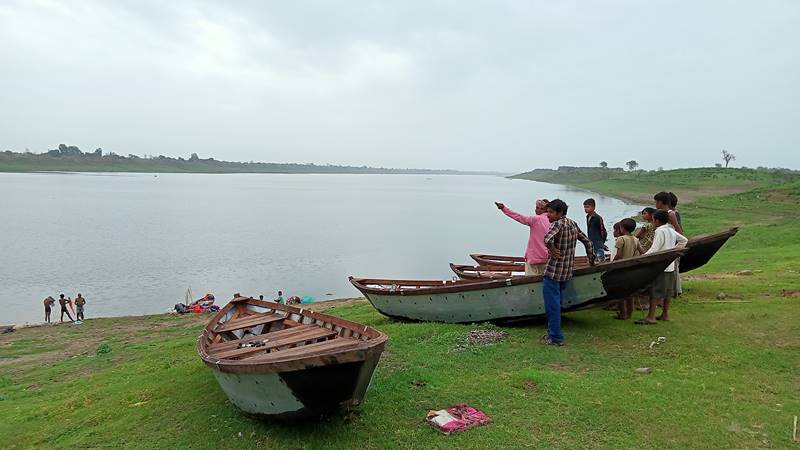
“Despite the ban, these outsiders were found fishing in the water on the night of August 7 at the Pichodi village (15 kilometres from Meghnath ghat),” informed Jitendra. “We informed the fisheries department about it and the officials registered our complaint and also sent a letter to the local police station to register an FIR (first information report),” he said.
When Gaon Connection talked to Sapna Mandloi, the Assistant Director of Madhya Pradesh’s Fisheries Department, she confirmed that there is a fishing ban in the state (as it is the fish breeding season) from June 16 to August 15, and that 10 workers were found to be fishing in the reservoir during the prohibited period.

“These people were catching fishes at night despite the ban. It is punishable by law,” Mandloi told Gaon Connection. “The villagers and the Narmada Bachao Andolan activists are worried about this new development as they fear that if outsiders come and fish in the reservoir, then what would happen to the livelihoods of the local fishing community,” she added.
Also Read: Five fisherwomen in Tamil Nadu set up Dolphin, a restaurant, and free their husbands of debt
The additional director also informed that her department has written a letter to the Barwani police station to book the accused under the relevant sections of the law.
‘Livelihood declined ever since the dam came up’
Ever since the Sardar Sarovar Dam project began to unroll, the fishing community at Madhya Pradesh’s Barwani district asserts it has been experiencing a decline in its livelihood then be it fishing or farming. The fishers first lost their villages to submergence, had to give up their fields which were a source of extra income and now have to face the fishing challenge from outsiders.
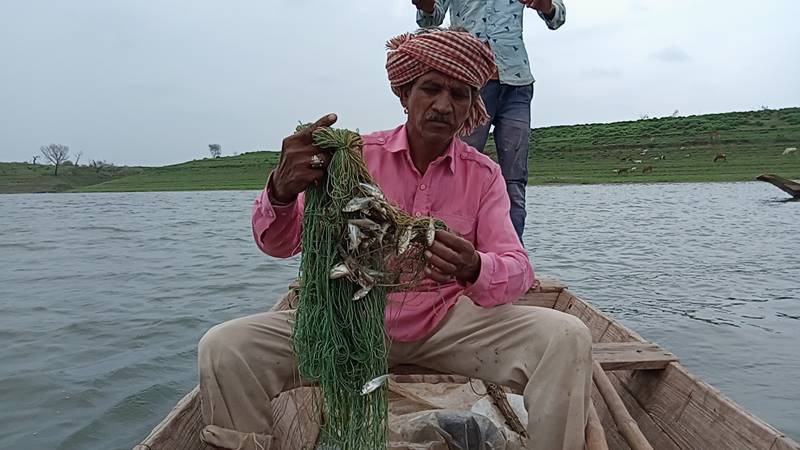
“Earlier we had the option of cultivating our lands, growing watermelons and muskmelons in the sandy land on the Narmada river bank but now all that is gone,” 44-year-old Bachcha Ram, a fisher from the Pichodi village in the Barwani, told Gaon Connection.
“The fishes don’t move much during the winters hence it’s difficult to catch them. In winters we relied on melon farming which used to get us an extra income of a lakh rupees per year. But now there’s no income to aid us. All we earn barely keeps us and our families alive,” said Ram who has a wife and three sons and they are all dependent on his earnings.
Still awaiting proper rehabilitation
Loss of land and livelihood aside, Rehmat, the social activist, told Gaon Connection that the fishing community, along with the other villagers living on the Narmada bank, are yet to be fully compensated and rehabilitated.
“They are living in temporary accommodation under tin shades and some of them have been relocated to the community centres and other government buildings in the village,” he alleged.
For instance, for the last three years now, Jitendra Majhi has been living in an anganwadi centre which is temporary accommodation for his family till they get new houses as part of the promised rehabilitation.
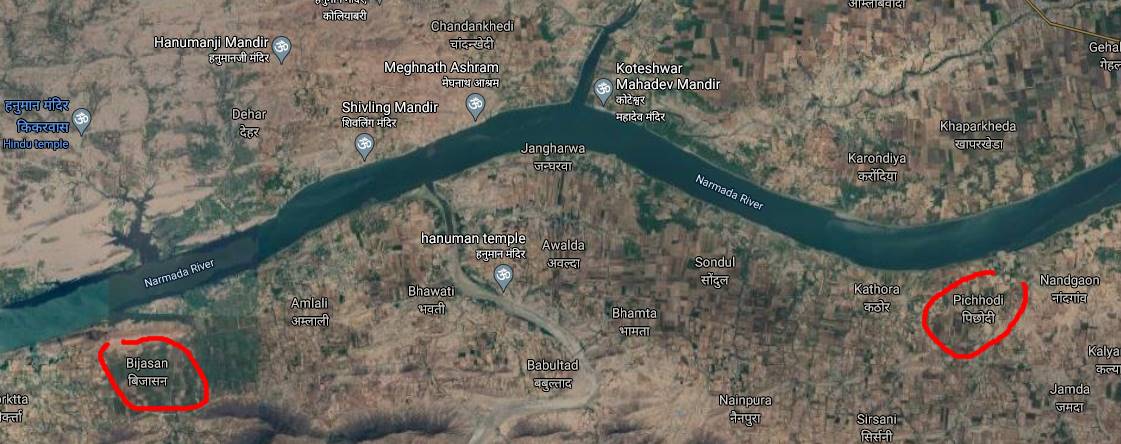
“We were told that we would receive a sum of five lakh eighty thousand rupees for the construction of a new house and a plot had to be assigned as well. But we are yet to receive it,” Jitendra told Gaon Connection. “I am living with my family in an anganwadi kendra (health worker centre),” he informed.
“The engineers assessed it wrongly in 2017. They stated that our village doesn’t fall in the doob area (area to be submerged by backwaters). But in 2o19 when water started filling up our lands, the authorities rushed to shift us to safe areas. We were then accommodated here but a permanent settlement is still not done,” the fisher said.
Wrongly accused, says the outsider trader
Gaon Connection contacted Anil Arya, a Nalchha-based (a town in Madhya Pradesh) fish trader who sent these workers from Uttar Pradesh to the backwaters of the dam in Barwani for fishing earlier this month. He claimed he was merely transporting his boats to Gujarat through Narmada river and was being wrongly accused by the local fishers.
“I get my boats built at Bhopal. It costs almost a lakh (Rs 100,000) rupees to get them transported to Gujarat by getting them loaded on a truck. It costs half the amount to transport them by river,” Arya told Gaon Connection. “To save the transportation cost, I asked my workers to take the river route. They were not fishing,” he said.
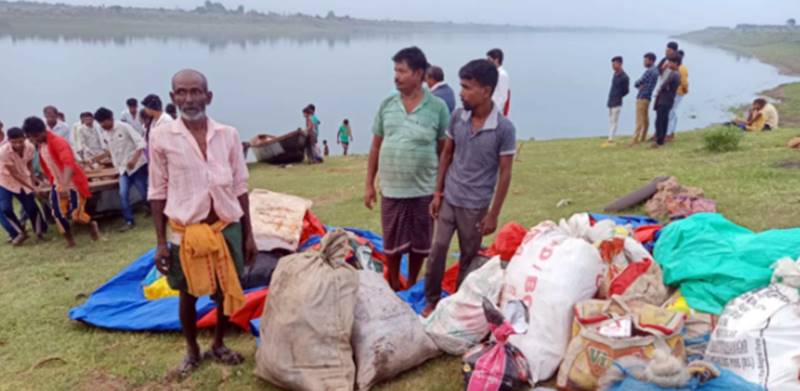
The trader went on to allege that two local fishers were demanding twenty thousand rupees from him for allowing the boats to pass through their area. “When I refused, they mobilised villagers against my business. I will fight the case in the court,” said Arya.
According to Rehmat, for now the outsiders have stopped all fishing activities in the reservoir but there is tension in the air and the villagers have adopted a wait and watch policy.
